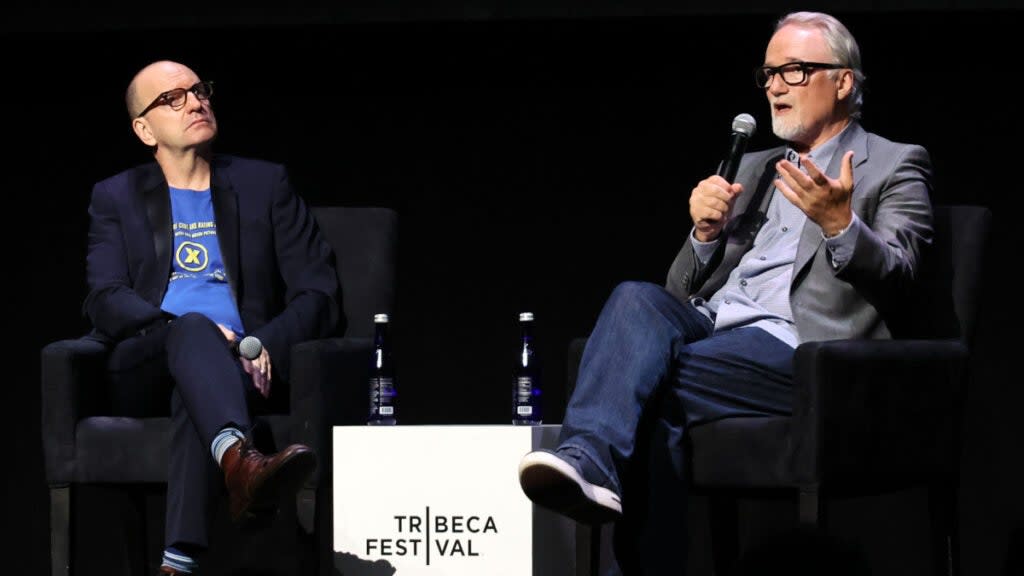David Fincher Talks ‘Alien 3’ Mistakes, Career Evolution With Steven Soderbergh: ‘I Came Out of a Truly F–d Up Situation’

As part of the 2023 Tribeca Festival, David Fincher candidly discussed his career, filmmaking process and philosophy with Steven Soderbergh before a capacity crowd in the Indeed Theater at Spring Studios for an hour on Thursday evening. The two have known one another for 31 years, and have been in frequent contact for 20, showing each other rough cuts for feedback. Audience members were treated to a rare glimpse of a meeting of two great minds working in American cinema, as they occasionally revisited topics of their private conversations.
They first met when Fincher was fired – for the second time – during production of his troubled feature debut, “Alien 3.” Both were set to direct episodes in the second season of the Showtime series “Fallen Angels,” but Fincher later pulled out after “Seven” got greenlit.
“I came out of a truly f–ked-up situation and kind of swore that I would never make the same mistake,” Fincher said of “Alien 3.” “I made a lot of brand new ones, but I’d never start something that didn’t have a script that I didn’t believe in or that I didn’t understand or that I couldn’t articulate to people. And I’d also very much learned that I wanted to make all my own mistakes instead of inheriting them from other people.”
The “Mank” filmmaker famously cut his teeth directing TV commercials and music videos, most notably Madonna’s monochromatic “Vogue.” He considers those early projects his film school. “I really went at it going, ‘I don’t want to spend my own money trying all this stuff out, so let’s see if Madonna will finance it,’” he said.
Also Read:
Tribeca Film Festival: ‘Cypher,’ ‘A Strange Path’ and ‘Between the Rains’ Take Top Honors
Though known for exacting his vision with clinical precision, Fincher has learned over the years that it’s best to first hash things out with cast and crew. Earlier in his career, he regarded an actor’s pushback as calling out the quality of his interpretation. But he now understands that actors struggle to find the tone just as he does, so he’s excited to get into that dialogue. Once everyone is on the same page, it can potentially save him two setups in the end.
“There’s no such thing as my editor, or my cameraman. It’s the people we’re lucky enough to get,” he said. “And if you really do feel that you’re lucky enough to get the costume designer that you want, it’s incumbent upon you to squeeze them for everything that they have. It’s more on you to get their best. Because it is Darwinism. The best ideas not only will win out, they should win out, and everybody’s there to help you.”
In addition to discussing working on and off the set and dealing with the studios, the auteurs also delved into the technical and logistical aspects of creating movie magic, such as when Soderbergh asked Fincher to break down a montage in “Fight Club” which, by Soderbergh’s estimate, involved 75 to 80 shots. Although the montage created the illusion that Edward Norton was traveling across the country, everything was actually filmed within five or six blocks of LAX.
Soderbergh observed that Fincher seemed happiest while imagining a project versus actually being in production, and felt that he’d seen the movies Fincher didn’t even make because of the way he had laid them out in his office.
“I have enough of a reputation as a misanthrope that I don’t need to feed into that. I love rehearsal. I love talking to people about the intention. I love haggling over every single word, and what the script means, and listening to people read it and hearing their ideas. I love casting. I love the casting process. I love designing the movie. I love sitting with the production designer, and the director of photography and all the art directors, and talking about what do we want to say, and where do we want people’s attention, and what are the things that we have to underline,” Fincher said.
“Shooting for me is a lot of indigestion and reality. They just keep seeping into everything you’re trying to do. So that part of it is difficult. And I think the first couple of times I had stuff fall apart even for the right reasons.”
After half an hour, the pair turned it over to the audience for questions. Seemingly everyone who stepped forward had some involvement in filmmaking or had graduated from film school. Some sought advice on getting the elusive big break. Interestingly, neither Fincher nor Soderbergh attended film school. Fincher deferred to Soderbergh on a question about access for independent filmmakers.
“You have to remember everybody that you’re trying to get to, that you’re coming up against this barrier of representation, at some point got there because they were probably really good in an independent film,” Soderbergh said. “All you do is to continue to make something that you care about and try and get other people involved and hope that some alchemy takes place that will vault you for a moment into the space that you want to be in. It’s better now than it was. It’s not good enough. Where the democratization of technology has resulted in the fact that it’s easier to make something now, something that looks really good for not a lot of money, but it’s harder to get it seen.”


